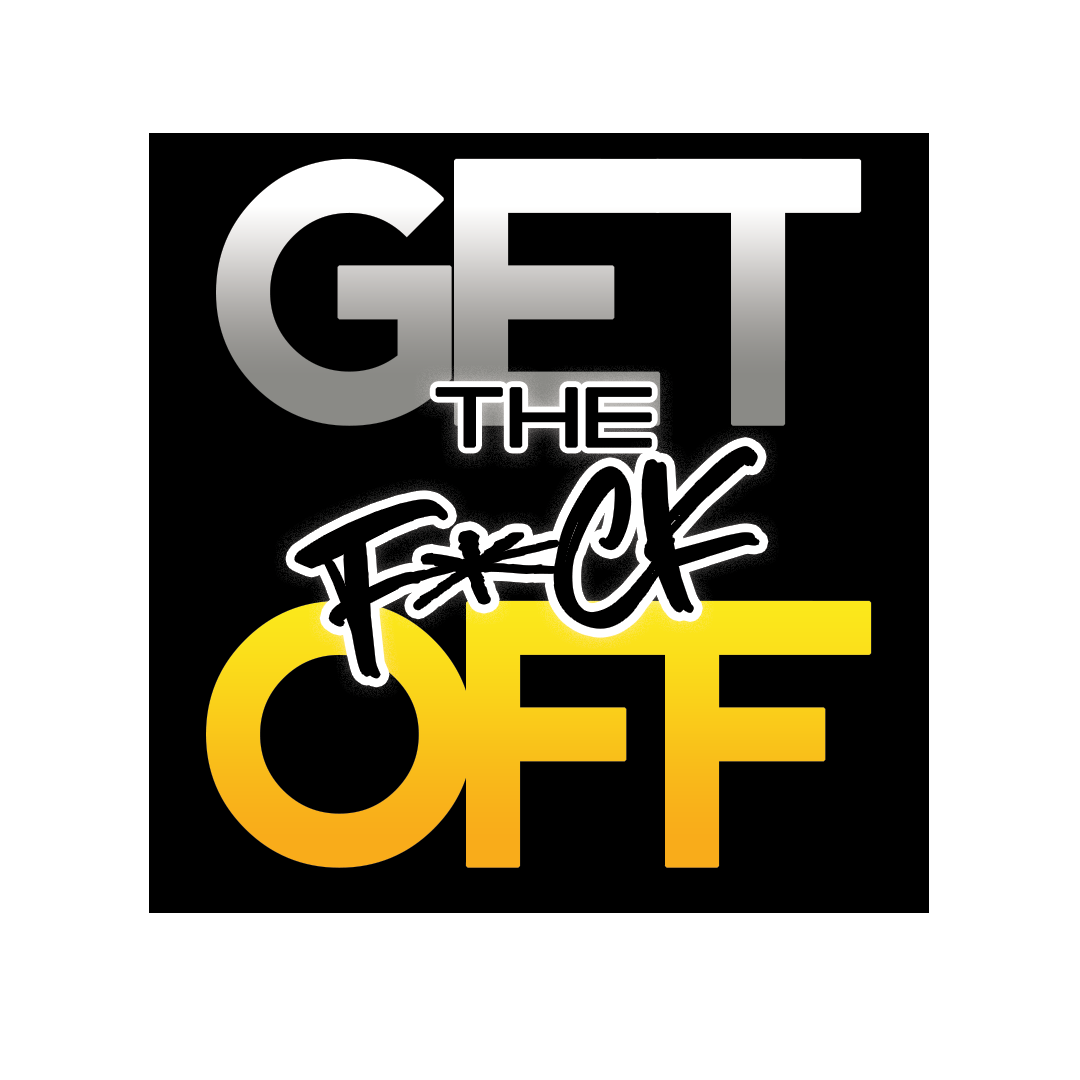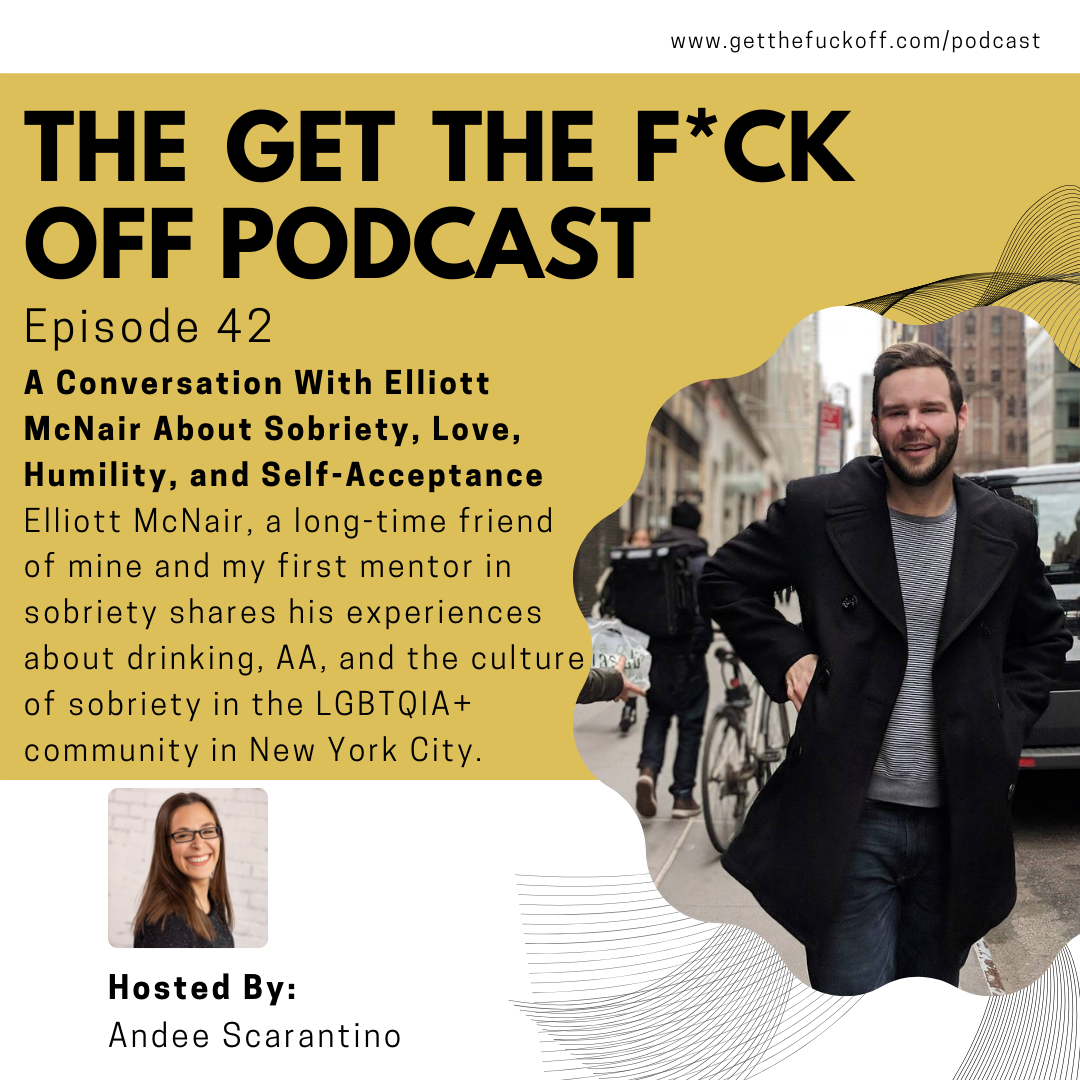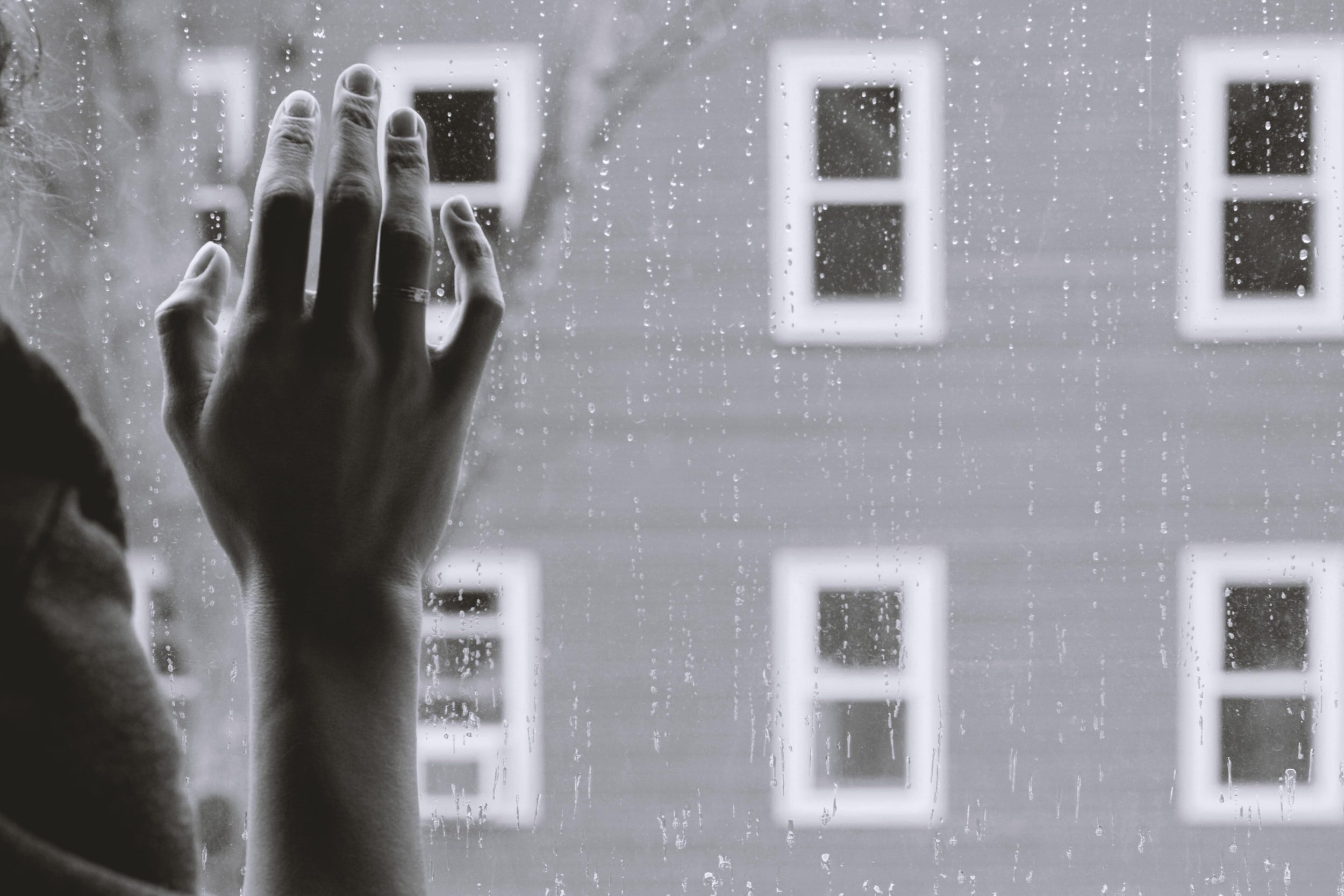
The Get the F*ck Off Podcast
A Conversation With Julia Machinshok About Suicide, Addiction, Healing Trauma, and Holistic Therapy
When Julia Machinshok lost her mother suddenly to pancreatic cancer in August of 2006, her world seemed to get out of control overnight.
At the time, she was drinking and partying very heavily and didn’t visit her mother the day before she died due to being hungover. The spiral of guilt and upset led her down a spiral of deep depression and alcohol abuse, and she found herself losing her job, having her car repossessed, and ending up without a place to stay at 8 months pregnant.
All of this was very traumatic for Julia. She was also repressing trauma from childhood, which she had not yet come to understand.
In 2014, things finally started to take a turn for the worse. Julia had been battling depression, alcoholism, and poor mental health in general. She began having horrible nightmares that would not subside, so she sought help from a psychiatrist.
The psychiatrist put her on a bunch of heavy-duty psychiatric medication, which didn’t seem to help.
The medication drug Julia into a place of numbness, and having her life slip slowly in and out of her control for years became too much. She attempted suicide twice.
Julia knew she had to take radical control of her life if things were going to change.
She sought out a therapist who she had once seen in the past who began specializing in a holistic approach to treatment.
Through months of work with mindfulness, hypnosis, and working through past experiences, Julia was able to conclude that her life and experiences were completely within her control.
She no longer takes medication, has been sober for four years, and now works as a case manager at a substance abuse treatment facility. Immediately, she knew it was where she belonged. She works with a phenomenal team, loves the work she does and feels fulfilled in knowing she is helping people live better lives.
On Redefining Who You Are to Live a Life You Love: Interview with Donny Hadfield-Smith
My guest this week is an incredible friend of mine, Donny Hadfield-Smith. Donny is an entertainment personality who just recently was contracted by The Dipp to co-host “I Am the Cute One: A Mary-Kate and Ashley Podcast.” It launched on June 13th and is available on all platforms.
This is Donny’s third podcast that has launched since November of 2020. His first podcast, “Know That: A Real Housewives Podcast” has been a big success, and from that, he started another podcast “Truly Anything.”
Donny has interviewed many celebrities, including Nikki Blonsky, Robert Ri’chard, and Kalen Allen.
However, before this, he was stuck in a life that made him unhappy.
When the pandemic began, Donny got laid off from his job. Even though he worked at the job for eight years, he never really felt any passion for it. It was just a means to an end. When everyone had to quarantine in early COVID, like many people, Donny was just “trying to survive.”
He locked himself in his house, gained a bunch of weight, and just hid from the world.
Then, in September, he found out that there might be a possibility he’d have to return to his old life, old job, and old routine. He suddenly felt a sense of upset, as if he would be returning to something that didn’t serve him, not having used the time to do something that brought him joy. He decided that if he would be drug back to his old life, first he was going to make sure that he created something and followed his passions.
Donny’s success might seem to an outsider quite instantaneous, but it was the result of daily work and a complete overhaul of how he chose to think about himself, and who he was showing up as in the world.
Now, he’s living the life he’s dreamed of, delivering hilarious and witty commentary about pop culture to a captivated audience, and he approaches each day as an opportunity, not as a source of dread and upset.
Brutally Sober: A No-Bullshit Conversation with Joe Conley
On this week’s episode of the Get the F*ck Off Podcast, I had the true pleasure of having a conversation with Joe Conley, host of the Brutally Sober podcast, and the Alcoholics Anonymous Deprogramming Podcast on YouTube.
Joe and I clicked right away. Maybe it’s just because we’re both no-bullshit East Coasters, or maybe it’s because we have a lot of similarities in our relationships with alcohol.
This conversation was very raw and real and explored many topics such as Joe’s experience in rehab, Alcoholics Anonymous, the science of drinking, our personal struggles with alcohol both past and present, sobriety during COVID, spirituality, enlightenment, identity, and being a fucking curmudgeon.
I absolutely loved talking with Joe and hearing about his life and experiences.
On Waking Up: A Discussion About Mental Health, Slowing Down, and Valuing Yourself with Russell Barlow
In August of 2018, Russell Barlow went on vacation with friends for the sixth year in a row. He found himself drinking to blackout for most of it, in the throes of a deep depression.
Following that trip, he was diagnosed with Bipolar 2, or as he calls it, “Bipolar Lite.”
What followed was a several-year process of waking up. The diagnosis was just the first step to a constant process of evolution and change.
In this episode of the Get the F*ck Off Podcast, we talk very intimately about Bipolar 2, mental health, and the stigma associated with it.
We talk about the pandemic, and the necessary pause that allowed for a respite in the American obsession with constant motion; a pause that allowed for some to experience a much-needed break from the assault of grueling jobs where they were undervalued.
We also talk about the importance of well-being.
Russell and I both worked in the hospitality industry for a large portion of our lives, which we use as a lens to examine the importance of work-life balance.
We also discuss the nationwide restaurant employee shortage and the dated mindset of the industry that imperatively needs to change its value system to become more person-centered.
A Different Approach to Addiction Treatment: Dr. Eric Fields and Harm Reduction Therapy
On this week’s episode of the Get the F*ck Off Podcast, I got the true pleasure of chatting with one of my favorite people, Dr. Eric Fields, who is a Cognitive Behavioral Psychologist specializing in treating addiction.
We talk at length about his alternative approach to the anonymous groups, which have become the American standard with low efficacy rates.
If you’re drinking too much or struggling with something else, but don’t want to go to meetings because you feel they’re not for you- this episode will shine quite a bit of light.
Eric and I share a similar philosophy on helping people grappling with addiction, which is a whole person approach. It’s about enhancing your entire life, not just attacking one specific area which often is a result of a problem, not the problem itself.
He also believes in meeting his patients where they are, instead of insisting on abstinence before progressing with treatment.
This was a great conversation.
If you:
-are struggling with addiction
-are struggling with weight loss (Eric initially worked with patients with eating disorders)
-are finding yourself unable to navigate your substance use disorder within the confines of the Anonymous group-centered American recovery model
Then you will love our conversation and this episode may give you hope.
Mountains of Learning: Interview with Stephanie Langner on Long-Distance Backpacking, Mindset Shifts, and Spirituality
On Episode 35 of the Get the F*ck Off Podcast, I am so excited to bring on a friend of mine, Stephanie Langner, who sold her house, left her job of 11 years as a Middle School teacher, and is one month away from flying west to begin her trek from Canada to Mexico on the 2,650-mile Pacific Crest Trail.
This is not her first long-distance backpacking adventure, having hiked the Appalachian Trail back in 2016.
Much of this episode focuses on the powerful mindset shifts that had to take place for Stephanie to complete such an incredible feat.
We also talk about spirituality, getting unstuck, gratitude, and living a minimalist lifestyle.
A Brief Podcast on Responsibility
This week, I’ve been preparing to shift gears a little bit, as for the new few weeks, I’ll be bringing on some amazing guests to share their stories and experiences with all of you.
Thus, this episode is the latest (and shortest) one I’ve done since I started the Get the F*ck Off Podcast.
It has to do with responsibility.
When and Why the Urge to Drink Hit Me on Saturday
On Saturday, I experienced my first urge to drink in quite some time.
Where I once struggled with this, feeling the need to drink is a rare occurrence for me.
Even on Sunday, when I bar-hopped for ten hours with friends only drinking club soda, I didn’t desire to drink for one second.
What was different about Saturday?
An unresolved issue reared its ugly head.
In this somewhat vulnerable podcast, I talk about what happened, and what needed to happen for me to move forward.
Lessons From My 72-Hour Water Fast
Last week, I embarked on a journey to do a 72-hour water only fast (with black coffee allowed. I’m not ready to be done with the last standing vice. Ha!)
This podcast isn’t so much to convince you to go on a water-only fast (although there are some real scientific benefits to it) but rather, to talk about my implementing tried and true strategies to get through it that I used for getting off a bunch of shit. (Drinking, smoking, DIET SODA, etc)
I also wrote several pieces about this on the Get the Fuck Off Blog during the week if you’d like to read more. This podcast piggybacks off of those.
Show Up Imperfect
People spend their lives waiting to do things until they feel they’re 100% “ready.” Yet, you’re never going to be 100% ready. The first time you do something, no matter how great you think you are, is probably going to be awkward as hell.
The world celebrates those who celebrate themselves, and who are willing to share their gifts with as many people as possible.
We have this idea that we should:
1. Learn to do the thing
2. Do the thing in secrecy
3. Talk about what we did and gain all the approval once it’s done
That’s actually not how it goes. It actually looks more like this:
1. Start doing the thing
2. Learn as you go
3. Speak proudly the whole damn way through.
Stop Waiting For the “One Big Thing”
Based on my blog post last week, this podcast is about how many people believe that there’s one “big thing” or “big opportunity” that will change their lives forever.
Thus, they find themselves in the trap of believing that they should bypass things or “over-analyze” their way into selecting the opportunity that best suits them getting to the “one big thing.”
The truth is, the life changing-moments we tend to have are usually ones that are completely unplanned and unexpected.
Do You Have a Lack of Time? Or a Lack of Will?
This podcast piggybacks off of my blog post last week entitled “For Those of You Who Don’t Have Time.”
One of the main excuses I get from newbies that come to me for help improving their lives is “I don’t have the time.”
Yet, the busiest, most successful people in the world seem to prioritize their health and well-being. They find the time.
Likely, it isn’t a matter of you not having the time, but rather that your perception of time needs to be renegotiated.
The Power in the “One-Degree Shift”
At the end of 2018, I ran my first marathon.
26.2 miles. 4:19:58 was my time as an ex-smoker who recently escaped obesity. That’s slightly under 10-minute miles. I was proud.
People on the outside saw this as this huge 180-degree turn. But for me, it was simply a series of one-degree shifts.
If you ask anyone who has made significant progress in any area of life, they’ll tell you that the smallest actions lead to the greatest results.
The key is to NOT ONLY make one-degree shifts but to also recognize what those one-degree shifts are.
“I’m Not Like Everybody Else.”
It’s not just a great song by The Kinks!
It’s also a common phrase and a symptom of a common problem for people who are experiencing things like substance use disorder: terminal uniqueness.
People often have this underlying belief that they’re so different from others, and for it, they don’t seek out community.
That’s an issue because community is one of the most important steps to recovery.
The Adjustment Period After Changing Your Identity
People like to think that changing a bad habit is simple, but outside of the physical addiction, there’s an entire element of identity that gets shifted when you change anything about yourself.
The problem? Most of the people in your life don’t change right along with you.
Does Analysis Paralysis Have You Wasting Years?
Feeling stuck?
You might be stressing over the most insignificant decision you’ll ever make. We tend to do that when we want something new in our lives.
Analysis Paralysis is real, but you can get past it by breaking things into small chunks, and by rapidly executing decisions that aren’t going to tremendously impact your life. (Like what shoes should you buy)
Breaking Bad Habits is Uncomfortable. Not Impossible
It's difficult to break bad habits. People like to use phrases like "this is hard" or "I'm a failure," but in reality, breaking bad habits is simply uncomfortable. Not impossible. Learning to recognize it for what it is is crucial to long-lasting change.





















